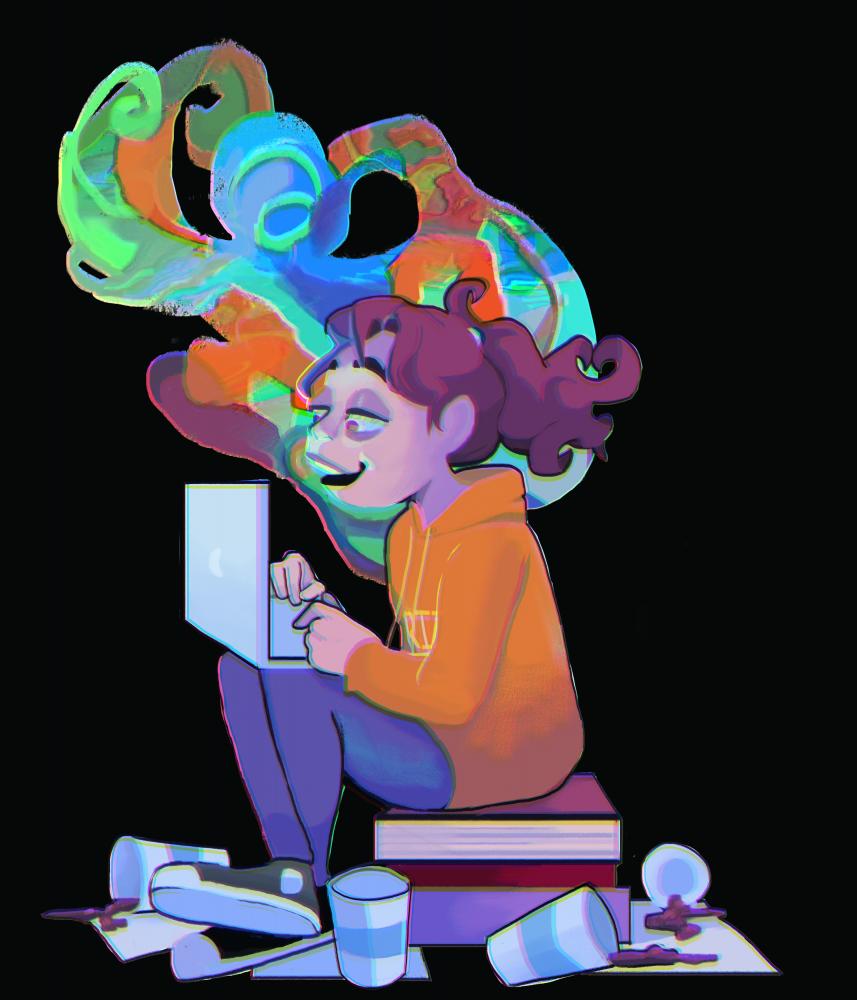Do We Really Need to Sleep?
by The Royal T. | published Mar. 31st, 2017
For years, parents and teachers have stressed the importance of a good night’s sleep. However, the necessity of sleep may be just another myth that we fall victim to. The philosopher Aristotle once referred to sleep as a “necessary evil.” For the first time, the “necessary” aspect is up to debate.
Dr. Dexter Jacoby is a research professor of brain stuff at RIT. Jacoby and a class of graduate students posed a single question: do we need to sleep? Although all humans feel compelled to sleep, over time, human sleeping habits have sharply decreased. According to the National Sleep Foundation the average American only sleeps 6.7 hours on a weekday. Jacoby suggests that sleep is holding humans back and we will one day evolve to never sleep again.
“For thousands of years, humans slept 12 hours a night and accomplished diddly squat. Now we sleep half as much but have so many more advancements,” Jacoby said.
To prove their hypothesis, Dr. Jacoby and his class recruited 10 student participants to go through their fall semester without sleep. All the participants for the experiments are seniors working on their final theses. Without sleep, these students will have more available time to study, socialize and complete assignments while avoiding the unneeded anxieties of stress dreams.
“Yeah, when the guy first told me that no sleep will help with grades, I’ll be honest, I thought he was crazy. Then, he told me he was a doctor so then I was like, why not?” Computer Mall Cop major and research participant Gregg O’Neile said.
Jacoby explained that before electricity, early man had no means to be productive during the night, so the habit of sleep developed from their boredom and lethargy. As man evolved we began practicing this period of inactivity out of familiarity, not necessity. Doctors almost unanimously agree that sleep is needed to retain memory, heal the body and reduce stress. However, Jacoby counters that other methods can replace the function of sleep, rendering it completely obsolete. Why then, would doctors tell us we need to sleep when we don’t?
“It’s a conspiracy!” Making Up Crap major and research participant Phil Osofy said. “Doctors tell us we need sleep because the government made them. Think about it. When we sleep, we’re vulnerable. We can’t protest when we’re sleeping. But the government never sleeps, that’s how they bug our brains.”
Osofy decided to sign up for the research experiment after he joined No Sleep No Peep (NSNP), an online activist group founded in 2016 that for months has been fighting the harmful propaganda and unregulated spying conducted by the U.S. government. Even the Why Do We Sleep homepage admits “we do not have a definitive answer to the question ‘why do we sleep?’”
Many agree that sleep wastes valuable time. The only perceivable advantage to sleep could be dreams, which are weird, hard to understand and often more trouble than they’re worth. Nightmares are worse, creating additional stress and anxieties that sleep supposedly remedies. For children, nightmares can be devastating and emotionally traumatizing. Emilia Mustard is the proud mother of a six-year-old boy named Dijon. She says her son used to be plagued with nightmares about a purple monster that would nip his toes.
“It was awful,” Mustard said. “He would insist on sleeping in our bed every night then toss and turn the entire time. One night I got a bruise the size of a grapefruit on my thigh because he clocked me with his foot during another one of his episodes.”
Mustard argues that parents only want their kids to sleep so they don’t have to deal with them.
“Parenting is 24-hour, people. You can’t half-ass it. My baby was tormented by sleep. So if I need make sure Dijon never sleeps again then that just makes me a good mother,” Mustard said.
During the six-week update, formerly enthusiastic participants seem less than satisfied with Jacoby’s test. Participants reported being both emotionally and physically exhausted, feeling detached from the world and an overwhelming sense of inadequateness. Two-thirds of the participants dropped out of the experiment and the entirety reported being placed on academic probation. However, graduate student and research assistant to Jacoby Michael Webb insists this is normal.
“Students are experiencing what is known as the 'burnout’ phase. It’s similar to how an addict goes through withdrawal. Our bodies are accustomed to functioning only a fraction of the time so it will need time to adjust to fully operating on a no-sleep cycle,” Webb said.
O’Neile was one of the first participants to withdraw from the experiment. He reported he was unable to put his extra time to good use.
“Yeah, I spent the first couple hours studying but I kept getting distracted. I was trying to go back to the text but after I’d reread the same sentence for the sixth time I gave up and played Minecraft. I completely bombed the quiz the next morning,” O’Neile said.
Motivation seems to be a major issue for many participants. Jacoby explains the no-sleep experiment gives students the opportunity to never need to sleep again, but it’s the students' responsibility to commit.
“Sleep is a mental tug-of-war. If you’re weak in the mind, you will succumb to your primitive desires to be sluggish. Only the strong can push away their feigned exhaustions and actually contribute something meaningful to society. Dreamers contaminate the gene pool,” Jacoby said.
Jacoby received multiple complaints from students, parents and colleagues on the conduct of his experiments. The campus declined to comment but did release a notification that Dr. Jacoby will no longer continue his experiments on RIT campus. So do we need to sleep? The results are inconclusve.



